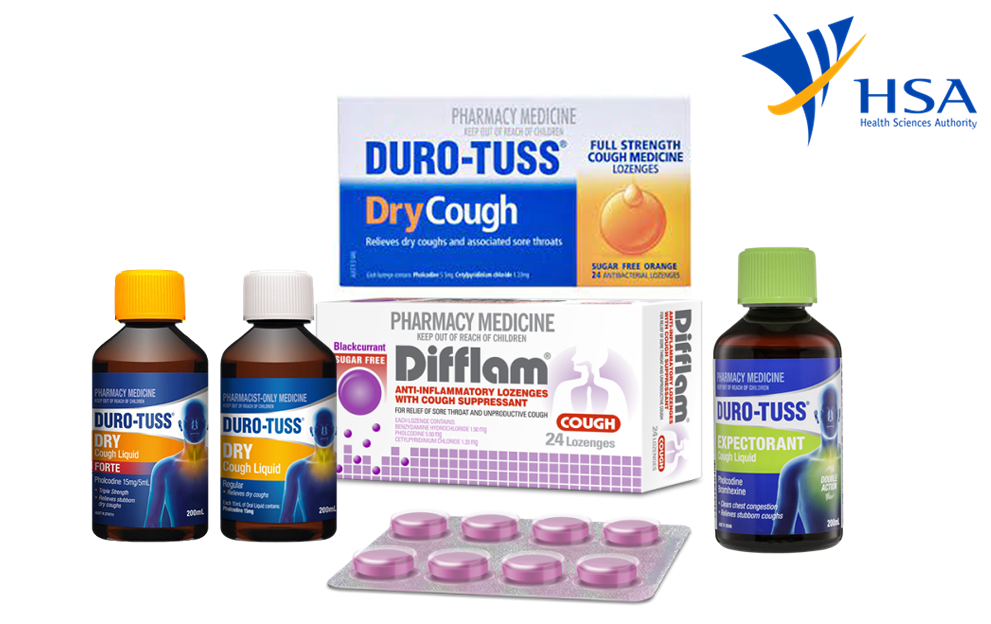(Edited July 1, 2023): This article has been updated for clarity and accuracy.
The Health Sciences Authority (HSA) in Singapore has made a regulatory decision to withdraw pholcodine-containing products from the market. This law affects a selected range of cough liquids and lozenges from the brand Duro-Tuss and Difflam.
This decision comes after a benefit-risk assessment conducted by HSA, in consultation with its Product Vigilance Advisory Committee (PVAC), concluded that the potential risks associated with pholcodine outweigh its benefits in treating non-productive cough. The concern is the increased risk of perioperative anaphylaxis (POA) when pholcodine is used with neuromuscular blocking agents (NMBA) during surgery.
Background
Pholcodine is a non-productive cough suppressant, for the symptomatic treatment of dry cough. Since 1993, Singapore has registered pholcodine for use as a standalone medication or in combination with other active substances for multi-symptom relief. There were seven pholcodine-containing products registered in Singapore, including Dhacodine Cough Syrup, Duro-Tuss Cough Liquid, Duro-Tuss and Difflam Cough Lozenges. These products were classified under Pharmacy-Only Medicine (P-med), which means consumers could purchase these products through a retail pharmacy, as dispensed by a locally registered pharmacist.
An iNova spokesperson responded, “There are alternative options available for the treatment of a dry cough. Consumers should be directed to their pharmacy or doctor for advice for an appropriate recommendation.” A full list of iNova products impacted by the market withdrawal of pholcodine-containing products can be found on their website for consumers to refer to. Other cough medications not containing pholcodine are still available.
Findings from the ALPHO Study
The regulatory decision was based on the findings of the ALPHO study conducted in France. ALPHO stands for Allergy to Neuromuscular Blocking Agents and Pholcodine Exposure. The study revealed that patients who took pholcodine within 12 months of exposure to NMBA had a higher risk of developing POA to NMBAs.
While the mechanism for the role of pholcodine is unclear, pholcodine is believed to induce the production of immunoglobulin E (IgE) antibodies. This could potentially lead to cross-sensitization with NMBAs and an increased susceptibility to POA. However, it is essential to note that the study found that only a small proportion of patients with IgE antibodies to pholcodine/quaternary ammonium would develop POA to NMBAs.
International Regulatory Actions
In response to the ALPHO study findings and other available information, several regulatory agencies worldwide have taken action to withdraw pholcodine-containing products from their respective markets. These include the European Medicines Agency (EMA), Australia Therapeutic Goods Administration (TGA), United Kingdom Medicines and Healthcare Products Regulatory Agency (MHRA), and Malaysia National Pharmaceutical Regulatory Agency (NPRA).
In Australia, the registration for pholcodine cough medicines were cancelled and products were recalled on 29 March 2023, after suspected 50 cases countrywide of reported pholcodine-related adverse reactions, including 1 case in which the patient died.
In Malaysia, the National Pharmaceutical Regulatory Agency (NPRA) received a total of 12 reports with 17 adverse events suspected to be related to pholcodine-containing products. while no deaths nor anaphylactic reactions were reported, adverse events included rash (1 case), rash macular (1), urticaria (1), and breathing difficulty (1) and diarrhoea (2).
HSA’s Benefit-Risk Assessment
HSA considered ALPHO study, pholcodine safety data, expert opinions, and international regulatory actions in its assessment. The overall absolute risk of pholcodine-associated perioperative anaphylaxis (POA) with neuromuscular blocking agents (NMBAs) was evaluated to be small. However, there are no effective measures to mitigate this risk in individual patients. Additionally, there are no biomarkers or tests to predict which pholcodine-exposed patients are at a high risk of developing POA to NMBAs.
HSA has concluded that the benefit of the ingredient does not outweigh the associated risk of cross-sensitization and POA to NMBAs. Firstly, they weighed the potentially life-threatening nature of POA. Secondly, they also considered the availability of alternative treatments for non-productive cough. In addition, they looked at the clinical necessity of using NMBAs during anaesthesia.
In response to CNA’s queries, HSA commented that “To date, there are no local adverse event reports of NMBA-related anaphylactic reactions suspected to be associated with pholcodine.” Severe allergic reactions associated with NMBAs is very rare and the risk is small even with the use of pholcodine-containing medications.
HSA is working with product registrants to withdraw all products containing pholcodine. For consumers who are undergoing any procedure that requires the use of general anaesthesia, they should inform their anaesthetist if they have taken any medication containing pholcodine in the past 12 months. The public should also seek advice from healthcare professionals on alternative treatments for dry cough symptoms.
A Singapore-registered pharmacist commented, “Cough can occur as a sign of an underlying condition. Over-the-counter medication can alleviate minor symptoms. However, if one experienced persistent or worsening cough, cough with blood in the sputum, cough accompanied with chest pains, breathing difficulties, they should consult a doctor for further evaluation…They should not take over-the-counter cough medication which may mask warning signs of more serious conditions.”
More information regarding HSA’s withdrawal can be found on their website.

